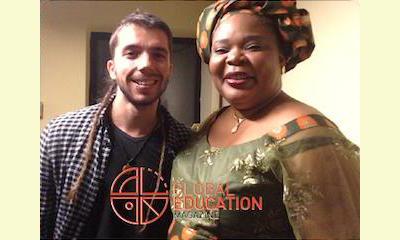|
|
International Women´s Day: Interview With Leymah Gbowee (Liberia)
an article by Global Education Magazine
Javier Collado Ruano: Today, 8th March 2014,
International Women´s Day, we have a special guest
with us: Ms. Leymah Gbowee, President of Women in
Peacebuilding Network (WIPNET) and 2011 Nobel
Peace Prize, along Ms. Tawakel Karman and Ms.
Ellen Johnson Sirleaf. Thank you very much to
attend us and to share your time and some of your
reflections with our readers in this special
today.

Javier Collado Ruano with Leymah Gbowee
click on photo to enlarge
Leymah Gbowee: Thank you very much to you Javier.
The pleasure is mine.
JCR: As an inherent specialist in Human Rights,
Woman Rights and Peacebuilding, do you think 90´
Liberian woman experiences is a good example of
Human Rights and Gender fight for other countries
around the world, especially in Africa?
LG: The Liberian women peace movement demonstrated
to the world that grassroots movements are
essential to sustaining peace; that women in
leadership positions are effective brokers for
peace; and the importance of culturally relevant
social justice movements. Liberia’s experience is
a good example to the world that women—especially
African women—can be drivers of peace.
JCR: I believe you. When we met last month of
September in Salvador de Bahía, Brazil, during
your conferences “Fronteiras do Pensamento”
(Boundaries of Thought), I felt all your enormous
courage comes from your ideological convictions
and specially from your role as Mum. Mother of six
children, you said that social changes must be
performed by mothers. What kind of message could
we send today to support their role as engine of
change of the world-society?
LG: There are three things women can do as engines
of change. First at the family level, we have to
go back to the space as mothers. We lay down the
values and principles for our children; we show
them what is right and how to care for others.
Many times and in many places, mothers think of
their children as friends, and don’t enforce the
values and principles of healthy living, of
leading a healthy life. Second, mothers understand
the challenges and ills of their communities. They
know what is wrong and what is right in their
communities. It is incumbent upon mothers to work
on the issues that can derail the safety of their
communities; if left untouched, the values and
principles of family are undermined. At the
national level, mothers must keep their eyes open
on the political dynamics because the personal is
the political. Politics affect the prices in the
market, the maternal mortality rate, whether our
children can obtain a quality education. Politics
even decide the reproductive rights of women.
Therefore, we must ensure that our political
representatives expand and protect our rights.
(This article is continued in the discussionboard)
|








|
DISCUSSION
There is no question yet associated with this article.
* * * * *
LATEST READER COMMENT:
(The following is continued from the main article listed above.)
JCR: There is no doubt you see the world-society with a rich and interesting approach after your long theoretical and pragmatically experience. In this sense, how do you imagine the near future? What are the hot points that human being should be focused to improve the current world?
LG: The issue of rights will continue to be a source of tension well into the future. If we look at the situation of conflict in many communities, a lot of it derives from individuals not respecting the rights of others whether its determining the sexuality of others or what happens to the bodies of people. We must recognize that the way you treat your neighbors extinguishes or ignites conflicts. Essentially, the hot point is: How do we respect the rights of individuals?
JCR: It is a good question and it is more interesting if we take a look at the future of humankind.. In fact, following some statistics from different studies, such as United Nations Department of Economic and Social Affairs inform of 2012, what kind of challenges will we face in 2050, for example, when the number of citizens arrive to 9,600 thousand of millions?
LG: There are two major challenges we now face that will continue to define our future: the environment and youth unemployment. The environment—specifically climate change— impacts the way we relate to the Earth and to each other. The scramble for environmental resources will continue to be a source of conflict exacerbated by youth unemployment. . ...more.

|
|








